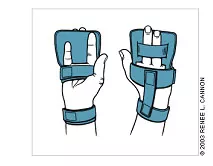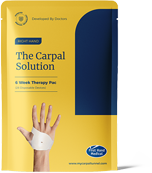Conventional Carpal Tunnel Treatment Options
There are 3 types of conservative treatments for Carpal Tunnel; wrist braces, oral medications, and steroid injections.


By The Carpal Solution Medical Team Over 300 years combined medical experience

Conventional Carpal Tunnel Treatment Options
There are 3 types of conservative treatments for Carpal Tunnel; wrist braces, oral medications, and steroid injections.


By The Carpal Solution Medical Team Over 300 years combined medical experience

There are three basic types of conservative conventional treatments:
 1) Wrist supports or splints
1) Wrist supports or splints
2) Oral corticosteroid therapy
3) Local corticosteroid injections
Wrist supports or splints may be helpful, but these can result in muscle atrophy and other complications. Oral corticosteroid therapy and local corticosteroid injections can offer short-term relief, but have long-term side effects.
Also, oral therapy has the disadvantage of treating the whole body rather than just the point where it is needed. Most people would rather not deal with routine injections.
Other Oral Pain Medications
Diuretics, nonsteroidal anti-inflammatory drugs (NSAIDs), pyridoxine (vitamin B6), and orally administered corticosteroids have been used with some temporary success in relieving symptoms in patients with carpal tunnel syndrome. A systematic review of conservative treatments for carpal tunnel syndrome the authors concluded that NSAIDs, diuretics, and pyridoxine are no more effective than placebo in relieving the symptoms of carpal tunnel syndrome. 1-5
It can generally be concluded that symptoms return in over 80 percent of patients with conventional conservative treatments. Better options are needed that allow daily activity, relieve pain, allow uninterrupted sleep and stop the progression of the syndrome without side effects such as muscle atrophy or steroids use.
Carpal Tunnel Release Surgery
 When conventional conservative treatments have been tried and failed for at least six months, it is generally recommended by most surgeons that the patient consider carpal ligament release surgery, but to be considered for reimbursement the diagnosis must be confirmed through nerve conductivity testing. Carpal tunnel strain has to have progressed to carpal tunnel syndrome at that point.
When conventional conservative treatments have been tried and failed for at least six months, it is generally recommended by most surgeons that the patient consider carpal ligament release surgery, but to be considered for reimbursement the diagnosis must be confirmed through nerve conductivity testing. Carpal tunnel strain has to have progressed to carpal tunnel syndrome at that point.
Surgery is done under twilight anesthesia. The drugs cause amnesia so it feels like one has been completely knocked out. Through an incision on the wrist, the carpal ligament is severed to relieve the pressure on the nerve.
The incision is sutured closed with the expectation that the ligament tissue will scar back together over several months leaving more space. This is not an exact science. One hopes that there will be no complications.
 Relief from pain is likely, but full recovery is uncertain. Patients usually have stiffness, and / or pain at the scar and may have complications with infection or nerve damage. The wrist will often lose strength because the carpal ligament has been severed and scars back together. Surgery requires months of rest and physical therapy after surgery to regain some of the original hand / wrist strength. Some improvement is achieved in 85% of cases with a return to full activity achieved in less than 70% of surgeries.
Relief from pain is likely, but full recovery is uncertain. Patients usually have stiffness, and / or pain at the scar and may have complications with infection or nerve damage. The wrist will often lose strength because the carpal ligament has been severed and scars back together. Surgery requires months of rest and physical therapy after surgery to regain some of the original hand / wrist strength. Some improvement is achieved in 85% of cases with a return to full activity achieved in less than 70% of surgeries.
When patients return to full activity, it is not uncommon for carpal tunnel symptoms to return within two years of the surgery lowering the success rate further. Surgery can be repeated when symptoms return, but it is generally not recommended to perform this type of surgery more than twice. Before doing surgery a second time most medical professionals will suggest a change of the repetitive activity causing the carpal tunnel syndrome. Often patients with work related CTS will still need to adjust job duties or change jobs after recovery from surgery.
The cost of surgery and rehabilitation is in the range of $3,000 to $7,000. The majority of the costs is usually borne by the medical insurer. However, over the last five years insurers and employers have been actively shifting more of the costs of healthcare services to the patient. This trend is accelerating. With increasing co-pays, the emergence of health saving accounts and much higher deductibles, informed proactive consumers are taking a more active role in self-managing the cost / benefit and the consequences of their medical services. This phenomenon will lead to an acceleration of the development of viable alternatives to conventional conservative treatments.
Call Experts on CTS to Ask Questions or Order the Carpal Solution
Toll Free: 1-800-798-5210 or 801-930-9240

RISK FREE 30-Day UNCONDITIONAL Money-Back Guarantee
The ONLY treatment for carpal tunnel that comes with a no questions asked money-back guarantee and in-house dedicated pain relief team.
 The Carpal Solution is FDA registered and made in a FDA registered facility.
The Carpal Solution is FDA registered and made in a FDA registered facility.



